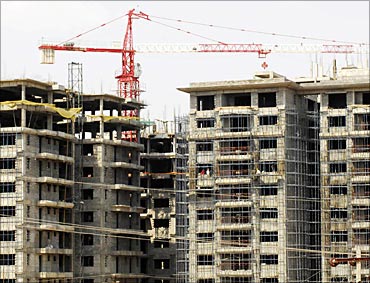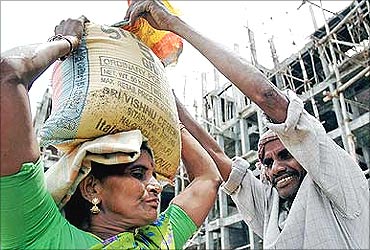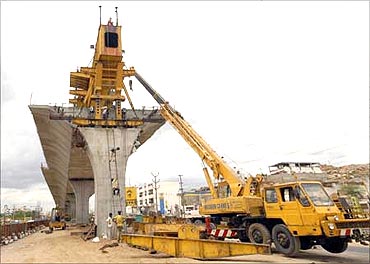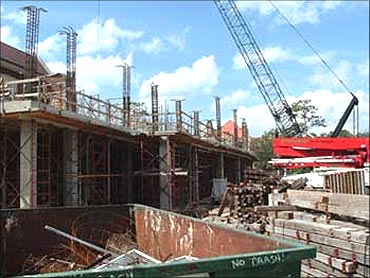
What does it cost a company to compensate the people from whom it buys land?
Even a cursory look at some recent land deals -- even in states like Uttar Pradesh or Haryana, which have so-called model land acquisition policies -- shows that the compensation package for land losers is usually a tiny fraction of the entire project cost.
This is true even when a company has to pay market rates rather than the much lower rates at which the state government buys land on their behalf.
In the case of Chhattisgarh the rate offered by the state government was a paltry Rs 50,000 an acre until it was recently revised to Rs 800,000.
All that companies pay in addition to this rate is a 20 per cent commission to the state industries development corporation, which acquires the land on their behalf.
In Karnataka, land acquisition rows have been widespread over the last few years, especially in the context of SEZs, the Bangalore international airport, as well as industrial projects like the one of ArcelorMittal in Bellary.
. . .

Mittal has been allotted 4,500 acres and the state government is buying land at Rs 7,00,000 an acre from farmers, who are demanding over ten times that, Rs 74 lakh (Rs 740 million).
The total project cost is Rs 30,000 crore (Rs 300 billion) and the cost of land and compensation comes to merely Rs 540 crore (Rs 5.4 billion), or just 1.8 per cent of the total cost. In fact, even if the company were to pay Rs 74 lakh (Rs 7.4 million) an acre, the cost to the company would be only Rs 3,000 crore (Rs 30 billion).
In Faridabad, Ballabhgadh and Palval on the outskirts of Delhi, farmers have been crying hoarse over an ongoing land acquisition exercise by the Haryana government.
While it is today cited as a model for other states in the matter of land acquisition, farmers say Haryana is denying people market rates, although it is offering them an annual royalty of Rs 15,000 an acre for 33 years.
The state government is acquiring land at a low rate of Rs 80,000-3,00,000, against the market rate of Rs 2.5 crore (Rs 250 million) an acre, says Rajesh Tikait of the Haryana farmers' movement. Interestingly, companies shell out market rates for the land when the state government sells it to them.
. . .

In Greater Faridabad, Haryana, for instance, the state government bought 1,832 acres in six villages at a rate of 16 lakh (Rs 1.6 million) an acre for a model industrial township, or MIT.
But the land is now being sold for Rs 5 crore (Rs 50 million) an acre to those setting up units there, according to activists..
At Ballabhgarh and Palval, thousands of farmers are agitating against the certain prospect of losing their land to the National Highways Authority of India for a mere Rs 16 lakh an acre.
In this instance, they won't even get the Rs 15,000-an-acre royalty for selling land to the Haryana government, says Rajesh Bhati of the Kisan Sangharsh Samiti in Ballabgadh. Bhati is losing 15 acres in the total 800 acres being acquired.
. . .

Similarly, Gail India is getting the state government to acquire 35 acres of land in Faridabad at a mere Rs 22 lakh (Rs 2.2 million) an acre, when the market rate in the area is Rs 1.7 crore an acre, says Bhati.
Gail India itself had bought 4 acres in Ballabhgadh at Rs 52 lakh (Rs 5.2 million) an acre before it approached the state to acquire more land, say farmers.
In Orissa, land is acquired either directly by industry or through the Industrial Infrastructure Development Corporation of Orissa in cases where companies have signed memoranda of understanding with the government.
The rate at which land is bought varies at between Rs 25,000 and Rs 2,00,000 an acre.
Take the instance of a disputed project like the one belonging to Tata Steel at Kalinganagar in Orissa.
The state bought land for Rs 1,00,000 an acre nearly two decades ago and sold it to Tata Steel for Rs 3,00,000 , angering the local populace. Tata Steel later paid Rs 4,00,000 and offered several other sops as compensation like land for housing, training and jobs for one person in a family and an annual allowance of Rs 2,000 per family.
With all that has been provided to families that lost their land, the total cost is only about Rs 400 crore (Rs 4 billion), out of a total project cost of Rs 18,000 crore (Rs 180 billion).
. . .

In another problem state where land acquisition disputes are rampant, Chhattisgarh, land compensation offered by the government is much better than that of Orissa.
But other than that, there isn't much difference. National Mineral Development Corporation, which is setting up an integrated steel plant at Nagarnaar in Bastar at a cost of Rs 15,000 crore (Rs 150 billion), is spending a mere Rs 69 crore (Rs 6.9 million) to compensate 1,052 people for the 318 hectares it has acquired.
The prevailing market rate in the area is Rs 200,000-300,000 an acre.
Orissa is not about to change its land acquisition policy despite the protests in the state over various projects. According to S N Patra, the state minister for revenue and disaster management, Orissa will come out with some changes after the introduction of an amended version of the Land Acquisition Act by the Centre.
In the case of Uttar Pradesh and Haryana, there is a growing demand that companies and governments should pay farmers according to the intended use of the land rather than the use to which it had been put to in the past. Ajit Singh, Rashtriya Janata Dal leader and son of former Prime Minister Charan Singh, says the state cannot act as a real estate agent.
(With reporting by Dilip Kumar Satapathy and R Krishna Das)